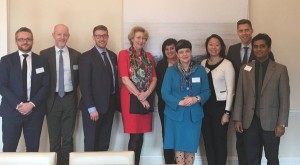9th March 2016 Mumbai, India
Attaché week – London
 Last week, I was in London for the annual meeting of the UK Intellectual Property Office’s (IPO) overseas attaché network. This was an excellent opportunity for me and my counterparts based in China, Singapore, Brazil, Geneva, and Washington DC to meet with a wide range of stakeholders in the UK across government, industry, and civil society. We met with trade associations, IP groups and companies – all representing sectors such as pharmaceuticals, consumer goods, music, and publishing.
Last week, I was in London for the annual meeting of the UK Intellectual Property Office’s (IPO) overseas attaché network. This was an excellent opportunity for me and my counterparts based in China, Singapore, Brazil, Geneva, and Washington DC to meet with a wide range of stakeholders in the UK across government, industry, and civil society. We met with trade associations, IP groups and companies – all representing sectors such as pharmaceuticals, consumer goods, music, and publishing.
Besides boardroom meetings, I spoke at a few outreach events. As a panelist at a Business Advisor conference, I discussed issues surrounding international technology transfer including licensing of intellectual property and drafting robust contracts for international partnerships. With a view to supporting UK-India partnerships, the UK IPO has developed several resources including a toolkit for protecting IP in Indo-UK research collaborations and IP fact sheets for India. In order to reach out to UK business more widely, I spoke about the Indian patent system at a webinar organised by the UK-India Business Council. I mentioned recent developments, which included guidelines for examination of computer-related inventions and mediation/conciliation services at the Trade Mark Registry, New Delhi.
The attaches also met with Baroness Neville-Rolfe DBE CMG, Parliamentary Under Secretary of State at the Department for Business, Innovation and Skills (jointly with the Department of Culture, Media and Sport) and Minister for Intellectual Property. The Minister revealed statistics which underscored the attaches’ contribution toward supporting UK businesses worldwide: attaches advised on issues worth £47 million in 2015, and facilitated protection of British IP assets worth £440 million worldwide.
As the week concluded, I reflected on the challenges and opportunities, with regard to IP, in the countries of my fellow attaches. Several of these were common, others not. Agreed! – the harmonisation of intellectual property frameworks worldwide might be a distant possibility. That said countries could certainly share best practices with each other to establish a level playing field. How about more international trade and prosperity for all?!